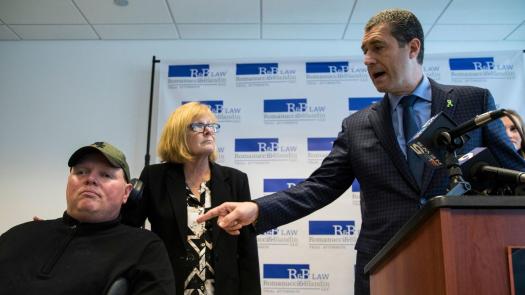GUEST BLOGGER
April 4, 2018
 Fifty years ago today, 39-year-old Dr. Martin Luther King, Jr. was shot dead by hate. Civil-rights concerns remain front and center in 2018, as trial lawyer and Fenwick alumnus Tony Romanucci reflects.
Fifty years ago today, 39-year-old Dr. Martin Luther King, Jr. was shot dead by hate. Civil-rights concerns remain front and center in 2018, as trial lawyer and Fenwick alumnus Tony Romanucci reflects.
By Antonio M. Romanucci ’78
When the term “civil rights” is invoked, many think of images of Martin Luther King, Jr. standing at the forefront of a street march protesting or standing at a podium challenging the leaders of this country for equality and inclusion. However, the reality is that civil rights is far older than MLK and, from its genesis, has evolved into something far more prevalent which dominates the news headlines of today.

Fenwick has a lot to do with my pursuit of justice over a legal career spanning more than 30 years now. The Catholic education I received emphasized inclusion, diversity and equality amongst us all. That helped shape my views towards the realization that we all should be treated with dignity, respect and equality. How many times do you think you have recited the pledge of allegiance? Surely, in the hundreds if not the thousands of times. At least 700 times over four school years at Fenwick alone! How many times have you said the words “and liberty and justice for all” and actually thought about what you were saying — and realized that our forefathers were setting the stage for our country’s future as a melting pot of people, made up of all sorts of races, ethnicities and backgrounds? If only they could realize how prescient they were but also how ominous the future was going to be despite their desire for equality amongst all.
Our country had to fight a brutal internal war to abolish slavery that cost this country economic, moral, emotional and philosophical scars that, to this day, cause deep controversy. Witness the takedowns of the statutes of General Robert E. Lee within the past 12 months because parts of the South remain loyal to a past that most of this country would rather forget. One of the unfortunate consequences of the Civil War left many African-Americans looking in from the outside. Many argue those ills have not been remedied since, despite the passage of the Ku Klux Klan act of 1871 and its nascent 42 U.S.C. Sec. 1983, the civil rights movement associated with Brown v. Board of Education; the tumultuous times of Emmit Tills and Rosa Parks; the aforementioned MLK era; and then, of course, the Civil Rights Act of 1964, which strengthened the rights of private citizens to sue municipalities, cities, states and government when they infringe on one’s constitutional rights.

Indeed, modern-day civil rights are an extension of the CRA and the powers that now lie in the hands of citizens to tell local, state and federal governments that the constitution and its amendments are sacrosanct and cannot be willfully violated — ever. The civil rights lawyer is a protector of those citizens and ensures that government violations are dealt with and, if necessary, paid for. Rest assured that without the civil rights lawyer existing, there would be no civil rights to protect in this country. I have become a civil rights trial lawyer. I am deeply proud of what I do for our people and our country.

The first thing required to determine if there is a viable claim to move forward with an action against a governmental entity for a civil-rights violation is whether or not the constitution was violated. Specifically, when it comes to my personal practice, was there a violation of the 4th, 8th or 14th amendment? What we are looking for is a determination whether there was an unlawful search and seizure, cruel and unusual punishment for a detained citizen or a deprivation of due process, respectively. The vast majority of clients we represented involve the 4th Amendment search and seizure issues.
Continue reading “The Modern Civil Rights Era and Police Accountability”
